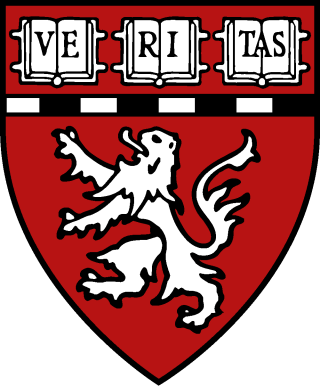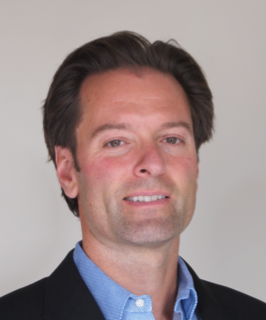
David Da-i Ho is a Taiwanese-American AIDS researcher, physician, and virologist who has made a number of scientific contributions to the understanding and treatment of HIV infection.

Harvard Medical School (HMS) is the graduate medical school of Harvard University and is located in the Longwood Medical Area of Boston, Massachusetts. Founded in 1782, HMS is one of the oldest medical schools in the United States and is consistently ranked first for research among medical schools by U.S. News & World Report. Unlike most other leading medical schools, HMS does not operate in conjunction with a single hospital but is directly affiliated with several teaching hospitals in the Boston area. Affiliated teaching hospitals and research institutes include Dana–Farber Cancer Institute, Massachusetts General Hospital, Brigham and Women's Hospital, Beth Israel Deaconess Medical Center, Boston Children's Hospital, McLean Hospital, Cambridge Health Alliance, The Baker Center for Children and Families, and Spaulding Rehabilitation Hospital.

Massachusetts General Hospital is the original and largest teaching hospital of Harvard Medical School located in the West End neighborhood of Boston, Massachusetts. It is the third oldest general hospital in the United States and has a capacity of 999 beds. With Brigham and Women's Hospital, it is one of the two founding members of Mass General Brigham, the largest healthcare provider in Massachusetts. Massachusetts General Hospital houses the largest hospital-based research program in the world, the Mass General Research Institute, with an annual research budget of more than $1 billion in 2019. It is currently ranked as the #8 best hospital in the United States by U.S. News & World Report.

Brigham and Women's Hospital (BWH) is the second largest teaching hospital of Harvard Medical School and the largest hospital in the Longwood Medical Area in Boston, Massachusetts. Along with Massachusetts General Hospital, it is one of the two founding members of Mass General Brigham, the largest healthcare provider in Massachusetts. Sunil Eappen serves as the hospital's current president.
Arthur Michael Kleinman is an American psychiatrist, psychiatric anthropologist and a professor of medical anthropology and cross-cultural psychiatry at Harvard University. He is well known for his work on mental illness in Chinese culture.
The University of Maryland School of Medicine, located in Baltimore City, Maryland, U.S., is the medical school of the University of Maryland, Baltimore and is affiliated with the University of Maryland Medical Center and Medical System. Established in 1807 as the College of Medicine of Maryland, it is the first public and the fifth oldest medical school in the United States. UMB SOM's campus includes Davidge Hall, which was built in 1812, and is the oldest building in continuous use for medical education in the Northern Hemisphere.

Harvey Vernon Fineberg is an American physician. A noted researcher in the fields of health policy and medical decision making, his past research has focused on the process of policy development and implementation, assessment of medical technology, evaluation and use of vaccines, and dissemination of medical innovations. Fineberg has held several prominent positions over the course of his career, including Dean of the Harvard School of Public Health, Provost of Harvard University, and President of the Institute of Medicine, now the National Academy of Medicine.
Mehmet Toner is a Turkish biomedical engineer. He is currently the Helen Andrus Benedict Professor of Surgery at Massachusetts General Hospital (MGH) and Harvard Medical School, with a joint appointment as professor at the Harvard-MIT Division of Health Sciences and Technology (HST).

Leon Eisenberg was an American child psychiatrist, social psychiatrist and medical educator who "transformed child psychiatry by advocating research into developmental problems".

Carola Blitzman Eisenberg was an Argentine-American psychiatrist who became the first woman to hold the position of Dean of Students at Massachusetts Institute of Technology. From 1978 to 1990, she was the Dean of Student Affairs at Harvard Medical School (HMS). She has for a long time been Lecturer in the newly renamed Department of Global Health and Social Medicine at HMS. She was also both a Founding Member of Physicians for Human Rights and an Honorary Psychiatrist with the Massachusetts General Hospital in Boston, a longstanding position there.
Bertha Kalifon Madras is a professor of psychobiology in the Department of Psychiatry and the chair of the Division of Neurochemistry at Harvard Medical School, Harvard University; she served as associate director for public education in the division on Addictions at Harvard Medical School. Madras has published research in the areas of drug addiction, ADHD, and Parkinson's disease.
Alice S. Huang (simplified Chinese: 黄诗厚; traditional Chinese: 黃詩厚; pinyin: Huáng Shīhòu; Wade–Giles: Huang Shih-hou; is an American biologist specialized in microbiology and virology. She served as President of AAAS during the 2010-2011 term.

Tony Nader is a Lebanese neuroscientist, researcher, university president, author and leader of the Transcendental Meditation movement. He has a medical degree in internal medicine, received his Ph.D. from Massachusetts Institute of Technology and worked as a clinical and research fellow at a teaching hospital of Harvard Medical School.
Chester Middlebrook Pierce was an American psychiatrist who was a tenured professor of education and psychiatry at Harvard Medical School. He was the first African-American full professor at Massachusetts General Hospital, and was past-president of the American Board of Psychiatry and Neurology and the American Orthopsychiatric Association. He was a fellow in the American Academy of Arts and Sciences. He was a senior consultant for the acclaimed educational children's television series Sesame Street. He also coined and developed the term "microaggression".

Carl D. Marci, is a physician, scientist, entrepreneur and author of the book, Rewired: Protecting Your Brain in the Digital Age. He is currently Chief Psychiatrist and Managing Director at OM1, a venture-backed health data company using artificial intelligence to improve patient outcomes. He is also a senior advisor to early stage health tech start-ups and a part-time psychiatrist within the Department of Psychiatry at Massachusetts General Hospital, and Assistant Professor of Psychiatry at Harvard Medical School.

Professor Rajendra D Badgaiyan is an Indian-American psychiatrist and cognitive neuroscientist. He is best known for developing a new neuroimaging technique for detection of acute changes in concentration of dopamine released in the live human brain during performance of a cognitive. behavioral or emotional task.
Jeffrey D. Macklis is an American neuroscientist. He is the Max and Anne Wien Professor of Life Sciences in the Department of Stem Cell and Regenerative Biology and Center for Brain Science at Harvard University, Professor of Neurology and of Neurosurgery at Harvard Medical School, and Principal Faculty of the Neuroscience / Nervous System Diseases Program at the Harvard Stem Cell Institute.
Collin M. Stultz is an American biomolecular engineer, physician-scientist and academic at the Massachusetts Institute of Technology and the Massachusetts General Hospital. He is the Nina T. and Robert H. Rubin Professor in Medical Engineering and Science at MIT, a Professor of Electrical Engineering and Computer Science also at MIT, a faculty member in the Harvard-MIT Division of Health Sciences and Technology, and a cardiologist at the Massachusetts General Hospital. He is also co-Director of the Harvard–MIT Program in Health Sciences and Technology

Joseph Thomas Coyle Jr. born in Chicago, Illinois, is a psychiatrist and neuroscientist that is known for his work on the neurobiology of mental illness, more specifically on schizophrenia. He is currently the Eben S. Draper Chair of Psychiatry and Neuroscience at Harvard Medical School in Boston, Massachusetts. He was President of the Society of Neuroscience from 1991–1992. [2] and also the president of the American College of Neuropsychopharmacology in 2001, He is a member of the Institute of Medicine.
Daniel Kalman Podolsky is an American gastroenterologist and member of the National Academy of Medicine. He serves as President of the University of Texas Southwestern Medical Center. and co-Chairman of Southwestern Health Resources, a collaboration between UT Southwestern and Texas Health Resources that cares for patients across North Texas and includes more than 30 hospitals, 300 clinics, and 2,600 physicians.










